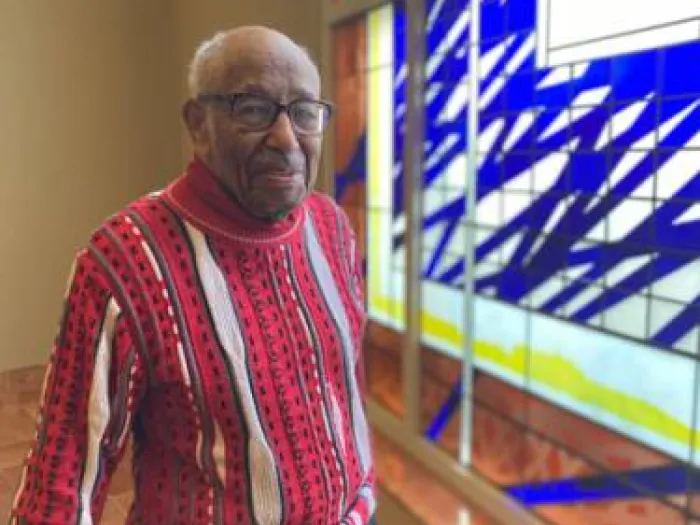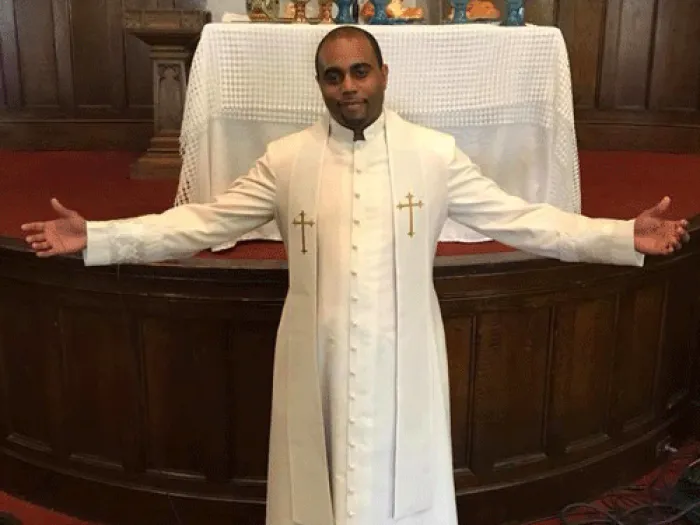Sarah McBride, pathbreaking Presbyterian
A sudden understanding came to Delaware’s newest member of Congress sitting in a pew on Christmas Eve at Westminster Presbyterian Church in Wilmington, DE

Sarah McBride, the child of a corporate lawyer — who was a teenage political activist and president of the American University student body — had always known she was a girl. Assigned male at birth, by the time she was a college junior, her life out of sync with her gender identity had become untenable.
Back at home with her parents, sitting in Wilmington, Delaware’s Westminster Presbyterian Church on Christmas Eve, hearing “O Holy Night,” she said to herself, “I cannot continue to miss this beauty,” and resolved to come out to her parents.
McBride’s autobiography, “Tomorrow Will Be Different,” is the story of her 20s, bracketed by two Presbyterian moments: the revelation at Westminster Presbyterian Church and the hymns sung at her husband Andy’s funeral, just a handful of years later. This youth elder is now Delaware’s sole member of the U.S. House of Representatives, the first openly transgender woman in Congress.

Born in 1990, McBride grew up with two brothers in an upper-class neighborhood of west Wilmington, what she called a “Leave It To Beaver” atmosphere. She recalls dressing up as Cinderella with girl neighbors. Like Cinderella at midnight, time would elapse on her fancy dress, and she would have to return to life as a boy.
The family was active in Westminster, dad as a ruling elder, mom as a deacon, and Sarah herself in church musicals and the youth group.
Her parents were successful and politically active, and Sarah was a young politics-obsessive, writing, “Growing up, I personally knew more U.S. senators than transgender people.” Her parents hosted fundraisers for Governor Jack Markell, and high-school-age Sarah phonebanked for Matt Denn on his run for insurance commissioner. As an 18-year-old, Sarah traveled the state as personal aide to Markell, “the Charlie Young to his Jed Bartlet.” At American University, she was elected student body president as a sophomore, and worked on gender-inclusive housing, fought campus sexual assault, and led efforts to make campus streets safe and accessible.
Despite believing in her parents — who had steadfastly supported one of her brothers when he came out as gay — Sarah lived in fear of disappointing them and her political family, and losing the trust of people like Markell, who would casually point to the governor’s desk and say, “when this is your chair.”
During the spring semester, Sarah told close friends at American that she was trans. For the semester they studiously called her “McBride,” Marines-style. On April 30, 2012, she posted a long note to Facebook coming out as trans, receiving support from posters on campus and immediate hugs from her frat brothers. The editor of the campus newspaper came over to her dorm to ask to run her note in the next edition, but with one request: “Cut it down to 600 words.”
In June 2012 she met Andy Cray, a lawyer with the LGBTQ+ advocacy portfolio inside the Center for American Progress. As a couple they navigated the routine 15-hour days of Sarah’s internship in the Obama White House Office of Public Engagement. In her memoir, Sarah relates the double bind of passing versus being read as trans inside the Office of Public Engagement — other staffers expressed surprise upon learning her identity, and this ironically tended to erase it. Paraphrasing the transactivist Faye Seidler, McBride’s experience was a reminder that in polls at the time, “more Americans said they had seen a ghost than knew a transgender person.”

McBride relates those struggles in part to illustrate her partner’s unwavering moral example. In one passage, Sarah is enraged by members of Congress who support regressive policies and legislation despite their being widely known as being LGBTQ+ themselves, wishing they could be outed. Andy stridently defends them, saying the good of unearthing mere hypocrisy isn’t equivalent to the harm of outing a person.
Sarah introduces her work with Equity Delaware in 2013 in terms of desperately wanting to move back to Delaware, and being terrified that the state lacked legal protections for trans people before the law. You could be fired for being trans, you could be denied public accommodation, like a hotel room, or a restaurant, or a bus if you were trans. With support from Governor Markell and attorney general Beau Biden, Sarah and the Equity Delaware team lobbied the legislature to pass, back to back, a marriage equality act and civil protections for gender identity. The struggle, even among Democrats, was intense.
Sarah confronts one State House member about her impending nay on gender identity protection, and the member offers “I voted for the gay rights bill. I’m a good person.” SB 97 passed and was signed by the governor on June 13, 2013.
The next year brought Andy’s cancer diagnosis, and struggle through treatment, remission, and recurrence. The couple was married August 24, 2014. Within the week Andy had passed.
Inequitable treatment lingers for trans people even after death. In McBride’s retelling, finding a funeral home that would treat Andy in alignment with his gender identity was a struggle.
At his memorial service, those gathered sang “Here I Am, Lord” — “a Presbyterian hymn that Andy and I both discovered a year before had been our favorite hymn growing up as active members of our local Presbyterian churches.”
Her longtime pastor Greg Jones says of Rep. McBride, “Sarah is a very bright, high-energy person who cares deeply about how people are treated. The Golden Rule must be stamped on her heart because she’s very focused on treating everyone fairly and with dignity.”
In a recent interview with CBS News, Rep. McBride said she felt God’s hand on her shoulder in Andy’s hospital room, and daily seeks to act with Andy’s "principled grace."
You may freely reuse and distribute this article in its entirety for non-commercial purposes in any medium. Please include author attribution, photography credits, and a link to the original article. This work is licensed under a Creative Commons Attribution-NonCommercial-NoDeratives 4.0 International License.




